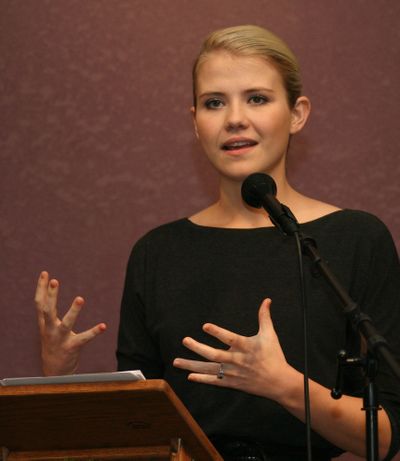Women Helping Women Fund celebrates 20 years

The Women Helping Women Fund will celebrate its 20th anniversary at its annual luncheon Monday. In two decades, it has raised $5.4 million and given grants to 350 programs that help women and children.
Women involved in the fund over the years attribute its success to:
• Its local vision
Women Helping Women got its start in the living room of Vivian Winston, a community volunteer who advocated for women’s issues. In the early 1990s, she gathered her friends to listen to two Eastern Washington University students who were struggling out of poverty.
Soon after, Winston and five friends outlined their vision at a lunch together. They would raise and spend the money locally, money given by women for women. Right after lunch, the women marched over to Winston’s husband’s law firm and incorporated.
• Its philosophy to “ask big.”
The required “donation” for the first lunch in May 1993 was $100, an unprecedented “ask” 20 years ago.
And then Mari Clack, one of the founding members, asked the women to “stretch” even more. Add up how much you paid for your shoes, your purse, she said. You can spend a small fraction of that money on the women, too.
“Stretch like Lycra,” she said.
After one of the early luncheons, a stranger approached Clack on a Spokane street.
“She said, ‘Are you Mari Clack? I want to tell you I believe this year I can stretch. I told the kids we don’t eat Fritos anymore,” Clack said.
• Its vetting process
Board members visit the agencies and organizations that apply for Women Helping Women Fund grants.
“Your money is going to a specific program that we know about,” said Christie Hinnen, a past president of Women Helping Women. “You are helping someone you could pass in the street, or a child in your child’s classroom.”
During the visits, board members build relationships with low-income women and their children, as well as the people who help them.
Lori Moloney, Women Helping Women Fund president, said, “A program that we will be funding this year supports teenage mothers. The director has two small children, is only paid for part-time work and works over 40 hours a week and is also pursuing her master’s degree in counseling.”
• Its practice of paying it forward
Some first-generation donors “still want to contribute, but as a sponsor for someone else. They ask me to find a student or a young woman working to improve her life,” said Lisa Diffley, the fund’s executive director. “Our donors see value in exposing the next generation to the event, the organization and the other women at the luncheon.”